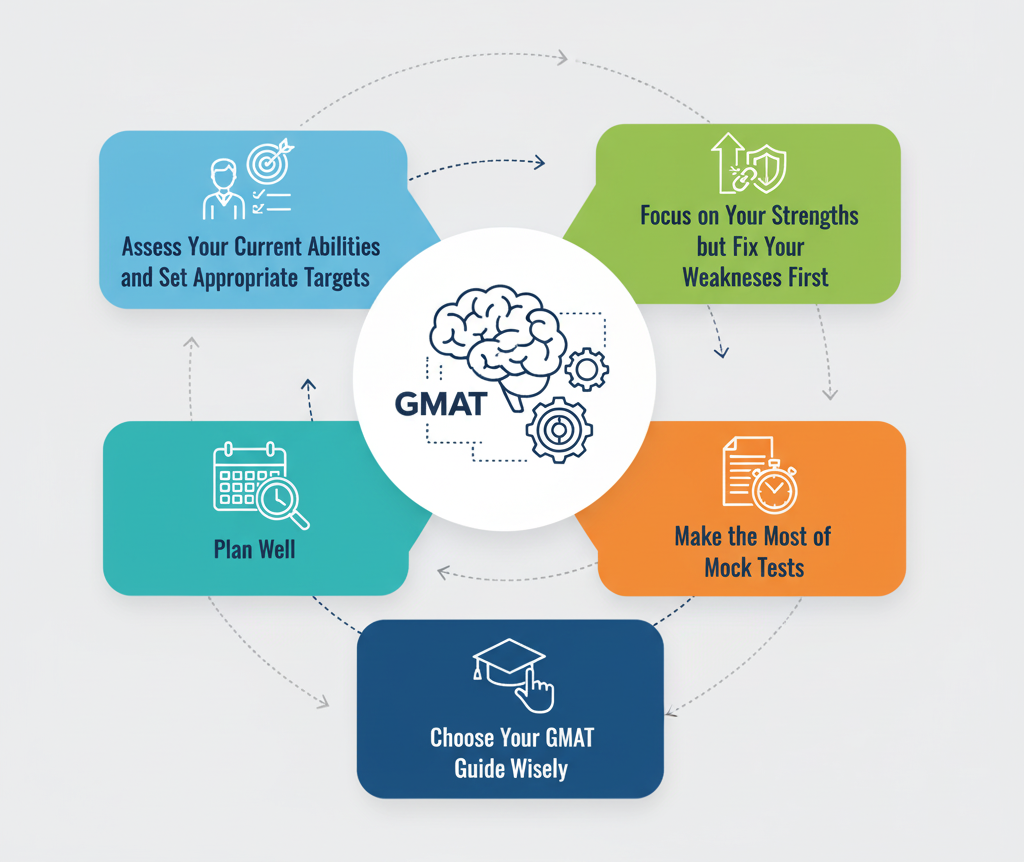The GMAT test is an integral part of the business school admissions process, and a stellar score on the test certainly improves your odds of getting admission to Top B-Schools worldwide.
So, how to start preparing for GMAT and secure an ideal score? At LilacBuds, we help thousands of GMAT aspirants secure their dream scores. Our mentors being the alumni of top universities themselves understand the process to its core. We provide curated practice questions and detailed strength/weakness reports for students to help them level up their GMAT test preparation.
If you’re wondering how to prepare for the GMAT exam, we are sharing below the must-follow success tips that will help you perform at your best.

1. Assess Your Current Abilities and Set Appropriate Targets
GMAT test is a reasoning-based adaptive test different from the other tests that emphasize knowledge of a specific academic subject. One starting with the preparation of the GMAT exam must understand the GMAT fundamentals such as the syllabus of the exam, exam guidelines, test structure, and assess themselves against each.
It is recommended to take up one of the many online testing tools and evaluate where you stand currently. For instance, if your quant score is faring well, but verbal comes out to be below average, that is where you need to invest more time and may require guidance from a professional.
You must set up your goals and milestones when you start the preparation. These may be time-based goals or activities-based, which eventually should align with the greater goal of achieving that ideal score. Then, take practice tests to analyse if your goals are realistic and what you would need to do to attain them.
2. Focus on Your Strengths but Fix Your Weaknesses First
GMAT is a traditional test with a long history. As a result, there’s no shortage of online and in-person resources about preparing for the GMAT exam. You can even find past participants sharing exam tips on public or private forums.
Please note: You must avoid getting overwhelmed by the abundance of information available on the subject and be clear in your approach and what you want to achieve.
It has been seen that many students do not invest enough time in identifying their strong topics and the weaker ones. As a result, students may focus more on their strengths and fail to invest the correct amount of time in overcoming their weaknesses. Therefore, to succeed in the GMAT test, you have to hit the right balance between your skill set and the right preparation approach.
We recommend that students keep taking full practice exams to know about their current standing and keep working on the shortcomings resulting in the lower scores. If you find the self-assessment process daunting, you must approach mentors who are experienced and can hand-hold you throughout the preparation journey.
3. Make the Most of Mock Tests
Taking practice exams or mock tests is the key to learning the right test-taking strategies, resulting in a much higher score. You create a new benchmark with each test you take and then take this as a baseline for the next mock test. Unless you appear for the actual GMAT exam, keep taking these tests.
We offer GMAT practice tests that feature 500+ highly curated practice questions. As you keep taking these tests, identifying the areas in which you need progress will become easier. Moreover, fine-tuning your timing with the exam time won’t be a problem for you during the actual test. As in the GMAT exam, it is not just your knowledge that counts but also how well you can manage to answer the questions in the given time, under pressure.
4. Plan well
Instead of asking how to prepare for GMAT, ask how much time should I dedicate to preparing? Most test-takers report that about a 3-month study timeline is ideal for the GMAT test prep, but please be aware that there is no one specific period that would fit all, it will vary from person to person, and you or your mentor would be the best judge.
To ensure that you prepare for the exam well in time, kindly keep a note of the following:
- Set a daily prep schedule. Not only decide when you will study but also what you will study.
- Top scorers typically spend between 120 to 180 hours practicing for the test. Give yourself more time to increase your chances of scoring 600 or higher.
- If you’re previously familiar with GMAT test materials, you may need less time. But, spend extra time on fixing your weaknesses first.
- Set aside three hours every three to four days to complete practice tests. Set timers, alarms, etc., to ensure you don’t spend too much time (more than three minutes) on each question.
- When answering practice test questions, make a habit of starting with the low-hanging fruits. By this, we mean answering the questions you find the easiest first. By doing so, your confidence will build.
5. Choose your GMAT Guide wisely
It is indeed crucial to thoroughly evaluate a tutor you may be considering. Some of the factors that you may consider are:
- Exam score of the tutor
- Teaching experience
- Read their reviews
Your tutor should be empathetic and energetic. Someone, who has been through the process, will be able to relate to your struggle and provide effective guidance.
Want a result-oriented GMAT preparation experience?
By now, you would have known that you can achieve your dream score successfully with the right planning and approach. We, at LilacBuds, offer personalised mentoring throughout admissions consulting and test preparation to our students desirous of applying to the top B-schools across the world. So, feel free to set up a diagnostic call with our mentors or reach out for any queries that you may have about preparing for the GMAT.
Read Related Blog: GMAT- Online v/s In-Centre














